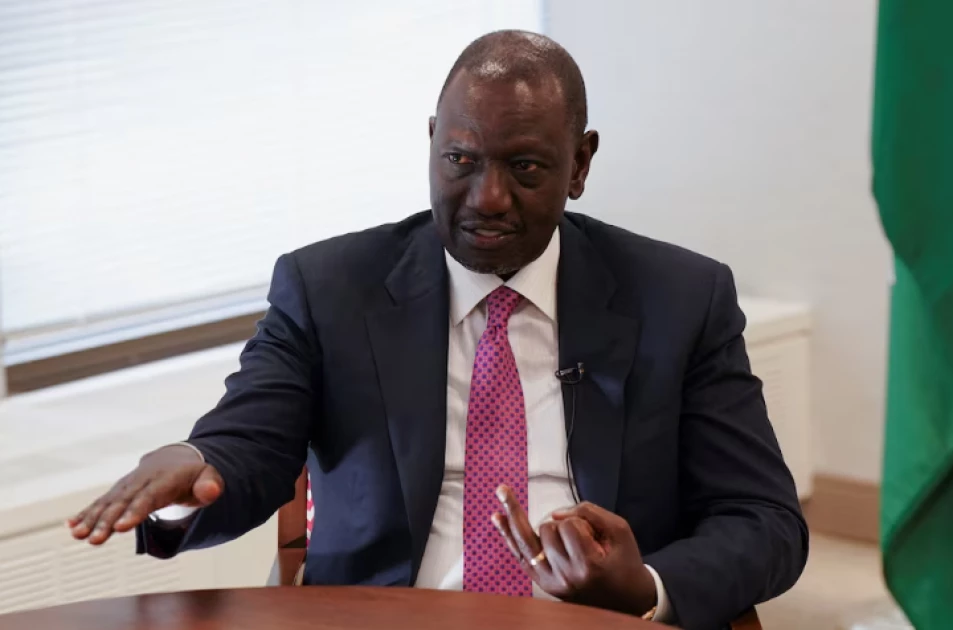OPINION: How Gov't can rebuild the public’s broken trust

William Ruto, President of Kenya, speaks during an interview with Reuters at the Permanent Mission of the Republic of Kenya to the United Nations, during the 80th United Nations General Assembly (UNGA) in New York, U.S., September 24, 2025. REUTERS

Audio By Vocalize

The Kenyan government is working to steer the
nation through a period of economic strain and public uncertainty with a
renewed focus on stability and trust. Having shouldered the weight of global
debt pressures and an expired IMF programme, it is now seeking new financial
support to safeguard essential services and sustain growth.
Alongside these economic efforts, officials are
tackling the spread of misinformation and pursuing justice in high-profile cases;
steps aimed at showing citizens that transparency and accountability remain
central to their leadership.
Economic reforms
aim to steady the nation’s finances
Kenya’s previous $3.6 billion IMF programme, which expired earlier this year, left East Africa’s largest economy in need of
fresh support amid high debt levels. President William Ruto’s administration is
now seeking a new deal with the International Monetary Fund (IMF) that includes
more favourable lending terms to refinance critical development projects and
social services.
An IMF staff visit to Nairobi in October took stock
of Kenya’s macroeconomic situation and discussed reforms to enhance fiscal
policy credibility and ensure the sustainability of public finances and debt.
Kenyan officials have expressed interest in a follow-up
programme with the Fund, and many analysts agree that securing a new loan
package is vital to anchor Kenya’s external debt repayments.
The urgency is clear. Public debt stands at nearly
70% of gross domestic product, well above recommended thresholds, squeezing the
government’s ability to invest in infrastructure and welfare.
In recent months, the Ruto government has moved to
restructure existing obligations and seek relief. It converted $3.5 billion in
Chinese loans into yuan to reduce interest costs and extend maturities.
Officials have even resorted to borrowing on domestic
markets to pay off maturing debts, hoping to ring-fence funding for key sectors
such as healthcare. “We need the IMF,” Finance Minister John Mbadi said this
month, stressing
that Kenya’s economic gains remain fragile and that more concessional financing
from partners like the IMF and World Bank is essential.
By pursuing a prudent fiscal path and seeking
support on better terms, the government aims to revive growth without imposing
the painful tax hikes that sparked unrest in the past.
These economic measures are intended to show
citizens and investors alike that Kenya is committed to responsible stewardship
of its finances – a crucial step in rebuilding trust.
Beyond economics, the Kenyan government faces a war of
narratives and a test
of justice that both deeply affect public confidence. Top officials have warned
of an escalating threat of misinformation and disinformation, which they said
during a public engagement in Nyandarua County has been spread by opposition
figures seeking to undermine trust in government institutions.
Government Spokesman Isaac Mwaura and Tourism
Cabinet Secretary Rebecca Miano told the gathering that Kenyans are being
targeted with coordinated propaganda designed to discredit government
programmes.
They warned that unchecked falsehoods circulating
on social media and elsewhere “severely erode the national fabric,” emphasising
the need for citizens to discern truth from rumour. They also used the forum to
highlight ongoing development initiatives as evidence of progress on the
ground.
President Ruto’s administration is keen to draw a
line between legitimate public-interest information and cynical falsehoods.
Officials insist that countering fake news is not about stifling dissent, but
about correcting the record for the public good.
At the Nyandarua County forum, government representatives
reiterated that development projects – from affordable housing to rural
electrification – speak for themselves, and that the public deserves accurate
information rather than politically motivated distortions.
The message from authorities is clear: constructive
criticism is welcome, but deliberate lies that incite fear or division will be
challenged in order to protect the public interest and unity.
Meanwhile, the government is also working to
demonstrate that justice and accountability are non-negotiable values in
today’s Kenya. In June, a tragic incident put this commitment to the test when
Albert Ojwang, a 31-year-old blogger and government critic, died in police
custody under suspicious circumstances.
The public outcry was immediate – protests erupted
in Nairobi and other cities as Kenyans demanded answers in a case that evoked a
painful history of police brutality. Rather than deny or stall, Ruto’s
government moved to confront the issue directly. The Police Inspector General
issued a public apology after an autopsy revealed Ojwang’s fatal injuries were
caused by assault, contradicting the initial claim that he had taken his own
life while in custody.
President Ruto acknowledged that the blogger died
“at the hands of the police,” describing the case as “heartbreaking and
unacceptable,” and vowed to ensure justice was done.
True to that commitment, prosecutors approved
murder charges against six suspects, including three police officers, for their
alleged role in the killing. One of the accused is the commander of the station
where Ojwang was detained. The Director of Public Prosecutions confirmed that
the officers would be brought before the court, marking an unprecedented move
in a country where members of the security forces have historically acted with
impunity.
Then Interior CS Kithure Kindiki stated that
“everyone who was involved in the crime is brought to justice expeditiously and
that no interference from any quarter” will be tolerated. By prosecuting even
serving officers, the government seeks to send a clear message that abuse of
authority will not be protected and that the rule of law applies to all.
A renewed social
contract
From the economic front to the information space
and the halls of justice, Kenya’s leadership is striving to regain public trust
through concrete action. Renegotiating debt relief and IMF support is intended
to show fiscal responsibility and ensure the state can deliver development.
Pushing back against fake news – while pointing to
real achievements – is meant to foster an informed, united citizenry. And
delivering justice in a high-profile abuse case demonstrates that the
government is willing to police itself and uphold the rights of its people.
These measures, if sustained, may gradually mend
the social contract between Kenyans and their government. The task is immense,
but by acknowledging past shortcomings and taking strides to address them,
Ruto’s administration is charting a course it hopes will lead to more credible
and trusted governance in Kenya.
[The writer is a freelance journalist and data analyst, combining storytelling with data-driven insights.]


Leave a Comment